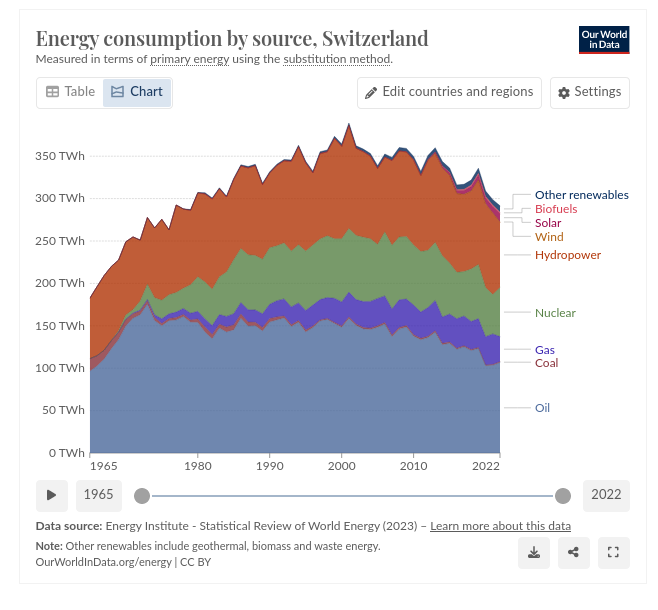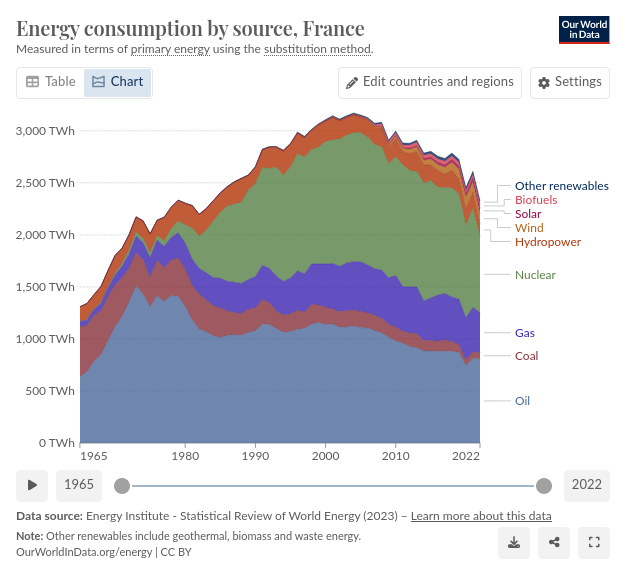

Microsoft is pivoting its company culture
Oh yes, the thing they’re well known for succeeding at.


Microsoft is pivoting its company culture
Oh yes, the thing they’re well known for succeeding at.


My cynical take: he wants to let the far right win the legislative elections while he still has close to 3 years left in his term.
He thinks this will “show” their electorate that voting far right doesn’t get you what you want.
At the same time, he can take advantage of the media bashing the leftist party has been getting for their vocal opposition to Israel’s actions since October 7 2023, and run them out of Parliament. At least, it’s a gamble he’s willing to make.
He is just as much of a clueless, egotistical liberal as David Cameron was, so your analogy is sadly pretty accurate.
This cannot be tolerated, even under Eisenhower.
I suddenly want to insert this into my everyday life


14% des votants LFI étaient prêts à voter RN…
Finalement, vu les résultats de l’élection elle même, ce n’est tristement pas si surprenant.


According to Our World In Data (which claims to use the Energy Institute’s Statistical Review of World Energy from 2023 as a data source), that waste is from producing around 70 TWh each year:

That only covers around a third of Switzerland’s energy consumption over those years. Furthermore, Switzerland is a small mountainous country with decent access to hydropower (making up around a third of its needs over the same years). They are not necessarily representative of the waste that would accumulate from a more agressive switch from fossil fuels to nuclear across the world (which is what we’re talking about, if I’m not mistaken).
France is about 10 times larger in surface area and according to the same source, consumed/produced over 1,000 TWh of nuclear energy each year:

And officially has still has no place to put the high-energy waste (source - in french), leaving it up to the plant’s owners to deal with it. There is an official project to come up with a “deep” geological storage facility, but no political will seems musterable to make that plan materialize beyond endless promises.
I should mention that I’m not super anti-nuclear, and I would certainly rather we focus on eliminating coal and oil power plants (and ideally natural gas ones as well) before we start dismantling existing nuclear reactors that are still in functioning order.
That being said, there are other problems with nuclear moving forwards besides waste management. The main one that worries me is the use of water for the cooling circuits, pumped from rivers or the sea. Not only do open cooling circuits have adverse affects on their surrounding ecosystems, as the planet gets warmer and the temperature swings during the hotter seasons become more pronounced, the power plants will become less efficient. The water going in will be at a higher temperature than it is today, and thus will absorb less energy from the nuclear reaction itself.
Overall, I don’t trust our current collective responsibility as a species to manage our current forms of nuclear production. Russia sent its own troops into the Chernobyl Exclusion Zone to dig trenches in contaminated soil last year, and they allegedly recognized last week that the Zaporizhzhia power plant is now “unsafe to restart” because of the military activity in the region.
The world has not experienced generalized warfare with nuclear power plants dotting the countryside; WW2 ended around a decade before the first nuclear power plants were up and running in the USSR, the UK, and the USA.
Not to mention how few European countries have access to uranium on their own soil/territory. Of course, most of the rare earth metals used in photoelectric panels and windmills aren’t found there either, but as least with “renewables” they are used once to make the machinery, not as literal fuel that is indefinitely consumed to produce power.
I don’t know enough about thorium-based reactors nor molten salt-based reactors to go to bat for them instead, but they seem like a more promising way for nuclear to remain relevant.

The comment in the 2nd screenshot, talking about the “new electric transfer station in Freetown Ma” along with the accompanying image looks it comes straight from a SCP appendix.


Ok, merci pour la précision!
Merde, un bon qui nous quitte…


“gros gg à ce crack”
Mdr vous faites pas de recherches complémentaires avant une interview? Entre nand2tetris, la chaîne youtube de Ben Eater, tous ces youtubeurs qui font des proc dans Minecraft et Terraria, et bien sûr les étudiants à travers le monde qui suivent des formations d’informatique qui partent de “bases solides”, l’habillage de cette vidéo fait penser à des commerciaux à 2 balles qui ne savent pas survendre chaque petit truc.
Après, bon, j’ai pas regardé la vidéo, si ça se trouve l’interview reste pertinente et tout ce que je critique n’est que partie du jeu YT pour rester rentable (je note que la vidéo de 11 minutes est créditée à 8 (!) personnes - effectivement il en faut des vues pour espérer tourner un profit).


Chaque fois que je re-découvre cette nouvelle, elle m’enrage un peu plus.
Tom est un sale type qui plombe non seulement sa boîte mais surtout le développement personnel et les carrières de tous les devs ayant le malheur de bosser sous son égide.
La boîte en soi on s’en tape. Mais quand tu ponds une merde pareil comme système de dev, tu de fait mets en danger la continuité de ton propre salaire en ouvrant la porte aux concurrents de ton employeur. Donc même pour ses propres intérêts c’est contre productif à long terme…


Je pense que c’est un schéma qu’on peut/va retrouver à chaque basculement depuis un service propriétaire et isolé à des outils qui nous laissent tant de liberté :
Ces gens ont bouffé du Reddit pendant 10 ans (voir 15-20), et maintenant qu’ils peuvent enfin faire autrement que là-bas ils ont 10 ans d’envies et de mauvaises expériences qui remontent simultanément. Et surtout, ils manquent 10 ans d’expérience de gestion/autogestion (d’une communauté fédérée en ligne, en tout cas).
C’est pas facile à faire tout en se déprogrammant d’une vision ou habitude “du haut-en-bas” ( top-down pour les anglophones).
J’ai bossé presque 5 ans dans une équipe autogérée ; on a quand même dû se payer une formation collective une fois qu’on dépassait les 15 personnes pour que le tout ne se désintègre pas.
J’ignore totalement avec qui tu as échangé mais j’imagine que c’est les admins de reddthat ? D’un côté je pense que tu pourrais tenter ta commu ici sur jlai.lu sans te taper ce shmilblique. D’un autre côté je comprends pas mal leur schéma voulu, et je regrette ne pas avoir le temps moi-même de leur aider à le rendre moins contraignant.
Surtout, je pense que laisser les gens faire ce qu’ils veulent, et les guider doucement à faire émerger la structure voulue, réussit mieux que de vouloir l’imposer dès le départ.


Il z une émission sur auposte.fr
Trop stylé, merci de me l’apprendre !


Quand on lui demande comment il supporte l’enfermement et les menaces policières régulières, il nous répond : «Tu sais, quand t’as vu le GIGN débarquer chez toi dès 3 ans… ça définit ton rapport à la police».
Wow. Ca m’émerveille qu’il garde la motivation de se battre pour les autres. À sa place je ne sais pas si j’aurai la force de continuer ma lutte vu les moyens déployés contre moi/lui.


You may also interact with countless bots without ever knowing, because creating fake identities is free.
Maybe. Bots don’t seem currently capable of holding a conversation beyond surface level remarks. I think I tend to engage with thought-provoking stuff.
On the off chance that I reply to a bot, it is as much for my reply to be read by other humans viewing the conversation. So I don’t understand how interacting with countless bots is supposed to be such a big downside.
Plus, I don’t see how public/private key pairs prevents endless “fake” identity creation/proliferation. It’s not like you need a government-issued ID to generate them (which, to be clear, still wouldn’t be great -just got other reasons).
Fair, some people value their identity.
To be clear, I’m talking about online identities. In which case, I would argue that if you value it so much you should not delegate it to some third party network. My IRL identity is incredibly valuable to me, which is why I don’t tie it up with any online communications services, especially ones I have no control over.
For average people nothing changes, the app can hold their key for them and even offer email recovery.
…so then the app can post on my behalf without me knowing? And it’ll be signed as if I had done it myself. I don’t understand preferring this if you’re not also self hosting.
That’s something having signatures and a web of trust solves.
But as I wrote in my previous message regarding gpg signing circles (a web of trust), that doesn’t “solve” things. It just introduces more layers and steps to try and compensate for an inherently impossible ideal. Unless I’m misunderstanding your point here?
Besides, you fail to see another problem: Whichever centralized, federated site you use can manipulate anything you read and publish.
I just take that for granted on the internet. It’s true that key-signing messages should make that effectively impossible for all but the largest third parties (FAANG & nation-states). But you still need to verify keys/identities through some out-of-band mechanism, otherwise aren’t you blindly trusting the decentralized network to be providing you with the “true” keys and post, as made by the human author?
Anyway, if you don’t see a need for tools like nostr you don’t need them.
Maybe I’m not expressing myself properly; I don’t see how nostr (and tools like it) effectively address that/those needs.
Sort of like how there was (arguably still is) a need for cash that governments can’t just annul or reverse transactions of, yet bitcoin and all cryptocurrencies I’m aware of fail on that front by effectively allowing state actors (who have state resources) to participate in the mining network and execute 51% attacks.


It weirds me out that most of the arguments for nostr I come across are around how “you can’t loose your identity, it’s just a private/public keypair!”. Maybe I just don’t get banned enough to understand the perspective, but to me the real problem is the content/discussions being lost, not usernames for some corner of the web.
I really don’t care about loosing my identity on a social media website; I’ve found it healthier to view social media accounts on the same level as my customer account at my isp and power utility. When I change ISPs, the old account is closed down and I start up a new one at the other ISP. What’s important to me is the service getting delivered, not that it remembers that I’m the same person from however many years ago. It’s still the same me here in my body, interacting with the web. I know what I need from it, it doesn’t always need to remember who I am (and sometimes I’d rather it forgot or never knew in the first place).
My final point is a bit of a troll, but also kinda serious: how decentralized is it when your identity is “centralized” in your key pair? Loose your keys or loose your password to the key, and your identity is similarly effectively gone. Even worse in this case, no-one can restore it for you. Which is why I don’t tie my identity that much to any online service, especially ones I don’t host. The only thing that truly preserves my identity is the flesh-and-blood body that I inhabit (and even that isn’t fail-proof).
I’ve interacted with GPG signing circles before. So many people are losing access to their keys. So many more are considering some of their keys as compromised. In either case they’re regularly generating wholly new keys, essentially rebooting their “identity” from scratch. When they do so, they always rely on flesh-and-blood interactions to have their new identity verified and trusted by others.
Maybe it’s a question of which circles we’re involved in; mine are already regularly hopping accounts, without being forced to by bans or server outages. I’m used to interpreting the tone & content to recognize “people”, and ignoring usernames. On top of that so many people regularly change their display names on social media for vanity and expression purposes that I can’t reliably use them anyways for recognizing accounts.


Lignes claires comme Tintin, oui.
Merci en tout cas pour ces liens, ça me fait découvrir !


Still, I think the only way that would result in change is if the hack specifically went after someone powerful like the mayor or one of the richest business owners in town.


Late to this thread, but this is disturbingly similar to the media-bashing a French-Palestinian politician has received recently.
She tweeted something along the lines of “time for an uprising” before attending a conference. The following week+ of interviews with her party colleagues were filled with “did you know uprising in Arabic is intifada?! Why is your colleague calling for violence?!?!?!”
Her name is Rima Hassan if you’re interested.


If the entire village is in agreement that the chickens are a nuisance, and they are indeed wreaking havoc on people’s gardens, etc: the villagers collectively setting up traps would be justified.
At some point, either whoever owns those chickens needs to pick up the slack and corral them, or they need to suck it up when the villagers take matters into their own hands.
Je crois que tu penses à “the narcissist’s prayer” (dont l’Internet me dit que c’est Dayna Craig l’auteur) :